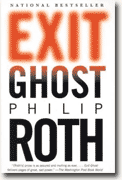Exit Ghost
Philip Roth
book reviews:
· general fiction
· chick lit/romance
· sci-fi/fantasy
· graphic novels
· nonfiction
· audio books
· author interviews
· children's books @
curledupkids.com
· DVD reviews @
curledupdvd.com
newsletter
win books
buy online
links
home
for authors
& publishers
for reviewers

 |
Exit Ghost Philip Roth Vintage Paperback 304 pages November 2008 |
|
Exit Ghost
But Zuckerman, beyond this restlessness, is restless still. After eleven years of virtually unbroken solitude, he is ill equipped to deal with the difficulties of New York City life - mobile phones, the massed throngs of people, billboards, signs, newspapers, magazines. It is too much, an information overload, and on top of that, his operation seems unsuccessful. Kliman, an ambitious would-be biographer of Lonoff, appears to harass Zuckerman, and Amy Bellette, her mind fogged from cancer, tells stories of his life and hers that may or may not have been true. Zuckerman, at the end of his career, forgetful, poor in health, could be forgiven if he wished to indulge in memory and self-congratulation. Oddly, this is something that is not done throughout the novel. Instead, almost all of the other characters say their piece on what they perceive literature to be. They are writers, all, and it goes without saying that they are readers. The prime importance of writing is given as - the writing. It is not the man which makes the writing. It is not the woman. It is the writing itself. Does a great scandal in the author's life change the impact, power, necessity or art of the works they spend their lives writing? Is the revelation of closet homosexuality or marital violence or some other secret enough to overshadow the author's true work? Zuckerman seems to think that the audience, that is the readers, believe yes, whereas writers themselves say no. He argues passionately for writing to be taken for what it is, and not what it is not. This concept of writing being more important than the author's life is played out with some poignancy through Zuckerman's interaction with Jamie Logan. He is enamored with her to the point of creating elaborate conversations between them, conversations where they argue sex, life, writing, reading. They converse with Zuckerman as 'He' and Jamie as 'She'. Invariably, Zuckerman comes across in these dialogues as witty and intelligent, but there is a sadness to them that allows for no physical consummation. For one, the dialogues are completely made up, extending from the awkward conversations he actually has with Jamie. But more importantly, Zuckerman is impotent, both physically and in his heart. He wants to love but he cannot, not properly. A man who loves, no matter his inability for true consummation, would love with all that he can, every aspect of himself that still functions as it should. But Zuckerman instead falls back on his writing, scribbling endless scenes where he is, in fiction, everything he is not, in reality. The He/She dialogues indicate that Zuckerman has only his writing, now. He lusts impotently for Jamie; all he can do is write a scene where she is interested, enthusiastic, understanding, empathic. He can't write a sex scene, because it would be dishonest to what he can, as a man in his seventies suffering from incontinence and impotency, accomplish. There is a sad tenderness to all this longing through words. Previously he has wanted to immediately tear off clothes and have wild, passionate intercourse with women - The Anatomy Lesson being a great example of this - but in Exit Ghost Exit Ghost Much has been made about the connections between Zuckerman and Roth. Is Roth Zuckerman? Is Zuckerman Roth? This novel is, largely, an answer to that, and the answer is this: Does it matter? If Zuckerman is a replica of Roth, mimicking exactly his mannerisms, eroticism's, witticisms, then so what? If Zuckerman is not, then so what? It should not and does not matter how similar they are, what matters is the writing itself. The novel should stand, or fall, on its own merits and not the personal merits of the author. For all the questions Exit Ghost Originally published on Curled Up With A Good Book at www.curledup.com. © Damian Kelleher, 2007 |
|
|
|
 Click here to learn more about this month's sponsor! |
|
| fiction · sf/f · comic books · nonfiction · audio newsletter · free book contest · buy books online review index · links · · authors & publishers reviewers |
|
| site by ELBO Computing Resources, Inc. | |
 From
From